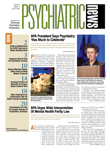Since September 11, 2001, U.S. Army soldiers have faced long and repeated (and near-certain) deployments. “If you join the Army now, you're going to war,” said Col. Elspeth Cameron Ritchie, M.C., a psychiatrist and director of the Army's Proponency of Behavioral Health program, speaking at APA's 2009 annual meeting last month in San Francisco.
Rates of anxiety and depression have risen with repeated deployments, and so has another worrisome statistic. Although military personnel are generally healthier than their civilian peers, suicide rates among Army soldiers have now risen to civilian levels.
A record 128 Army soldiers committed suicide in 2008, and there were another 64 in the first four months of 2009.
Recently, the commander of the Army's Fort Campbell, Ky., home of the 101st Airborne Division, ordered a three-day suspension of regular duties to focus on suicide awareness and prevention training after at least 11 confirmed or suspected suicides in the unit.
Epidemiological studies have identified some risk factors for suicide. These include being impulsive; being young, white, male; having access to guns; and having romantic problems at home, said Ritchie. About one-third of suicides occurred during deployment to Iraq or Afghanistan, one-third after return from those countries, and one-third among troops who had never served there, said Ritchie.
Seventy percent of suicides in the Army involve firearms, she said. Half of all soldiers who commit suicide were seen in the military health system in the year before the event, but that did not prevent the fatal outcome. A major prior psychiatric diagnosis is not a risk factor, but there is probably a lot of undiagnosed illness among these soldiers, she added.
The stresses of combat and danger add to the burdens of repeated deployments and family separations for soldiers and their families.
“The Army is tired,” said Ritchie. “Soldiers and the people who care for them—including their officers—may not be as nurturing as they could be at this time.”
Despite ongoing, Army-wide suicide awareness training, the service could do a better job of risk assessment, said Ritchie. “Suicide strategies are easy to talk about; the problem is finding the concrete steps needed to get to resilience.”
At the end of a deployment and again three to six months later, soldiers routinely fill out health assessments that include four questions related to PTSD and two to depression. However, these assessments are not suicide-screening tools, said Ritchie.
“We're looking at putting a suicide screen into these questionnaires, but what is a valid five-question suicide screen?” she said. “We haven't found it.”
Despite efforts to destigmatize psychological care, soldiers are often reluctant to seek help for fear of losing their jobs or letting down fellow members of their units, said Ritchie.
“We have to reach out to them,” she said, “but at the same time not make them feel crippled.” ▪

